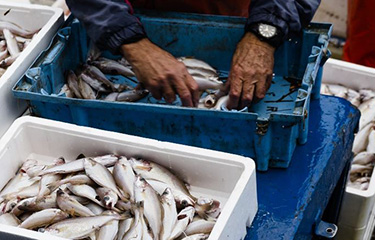Tesco, Asda, and Morrisons are among the members of a business group investigating alleged mistreatment of migrant fishers in the U.K. fleet.
The Seafood Ethics Action Alliance, a U.K.-based pre-competitive organization whose members include 11 of the largest supermarket chains in the United Kingdom, collectively representing 95 percent of all retail seafood sales in the U.K., is looking into allegations – brought to light by The Financial Times – of mistreatment of migrant crews working on British fishing vessels.
There have been previous allegations of mistreatment of some of the estimated 1,200 migrant fishers serving onboard vessels fishing in a 12-mile limit from the U.K. coast, which under ambiguous wording in current laws, allows operators to treat their crew as if they were fishing in international waters. The special status is granted via skilled worker visas that limits those workers’ ability to come ashore between fishing trips.
However, in June 2023, The Financial Times profiled four Filipino workers serving onboard vessels working as part of the Anglo-North Irish Fish Producers Organisation (ANIFPO) fleet, who claimed they had been subjected to mistreatment including limitation to access to medical care and forced labor.
“We are working to ensure that a robust independent investigation into the allegations is completed as a matter of urgency, and we are in touch with fishing sector representatives in Kilkeel regarding the methodology and timeline for this,” SEA Alliance said in a statement. “The SEA Alliance will be carefully reviewing the findings as soon as they are available, and will support the sector to implement any improvement actions required.”
The group has convened a Human Rights Allegation Engagement Group and is working with non-governmental organizations and fishing sector organizations to explore the feasibility of a Worker Driven Social Responsibility (WSR) pilot in the Scottish fishing sector, but “there is more that can be done,” it said.
“Advocacy and engagement is a key role for the SEA Alliance. We are engaging with governments of key sourcing countries to promote ratification and effective implementation of key conventions. In addition to the role of governments and international organizations, we are also advocating for standards and certification bodies to ensure that human rights and labor standards are adequately covered by their standards and processes,” it said.
SEA Alliance Head Andy Hickman told Supply Chain Brain the investigation into the specific allegations in the Financial Times article will be thorough, and will also examine “wider human rights reform” within the U.K. fishing sector.
“We’ve been working to ensure it’s a robust, independent investigation,” he said. “The issues faced by the workers … aren’t unique to Northern Ireland. Alongside this investigation, it’s critical that we work with the fishing industry on a wider program of reform that addresses the root causes which contributed to the allegations.”
The U.K.’s 2022 Nationality and Borders Act introduced stricter measures on fishing labor that came into effect in April 2023, which prohibit those with U.K. transit visas from engaging in commercial fishing. As a result, several smaller fishing boats have been forced to tie up for months because they can no longer employ overseas crew, according to the Financial Times. But vessels fishing within the 12-mile limit are exempt from that rule if they obtain skilled worker visas for migrant crew.
Some NGOs and labor unions, including the International Transport Workers’ Federation, are pushing for that loophole to be closed, in addition to guaranteed rights minimum standards for pay and working conditions for migrant laborers.
“The government and seafood companies have turned a blind eye to the open secret of migrant labour exploitation in UK fishing for too long,” ITWF Fisheries Expert Chris Williams said. “This should be about workers and working conditions, not where the fish is caught.”
A U.K. government spokesperson urged the country’s fishing industry to reform itself.
“[The government has] offered a generous support package to help [the industry] adjust to the U.K. immigration system, but the sector must urgently tackle the increasing levels of labour abuse being discovered at sea," the spokesperson said.
Photo courtesy of Maritime Fairtrade







